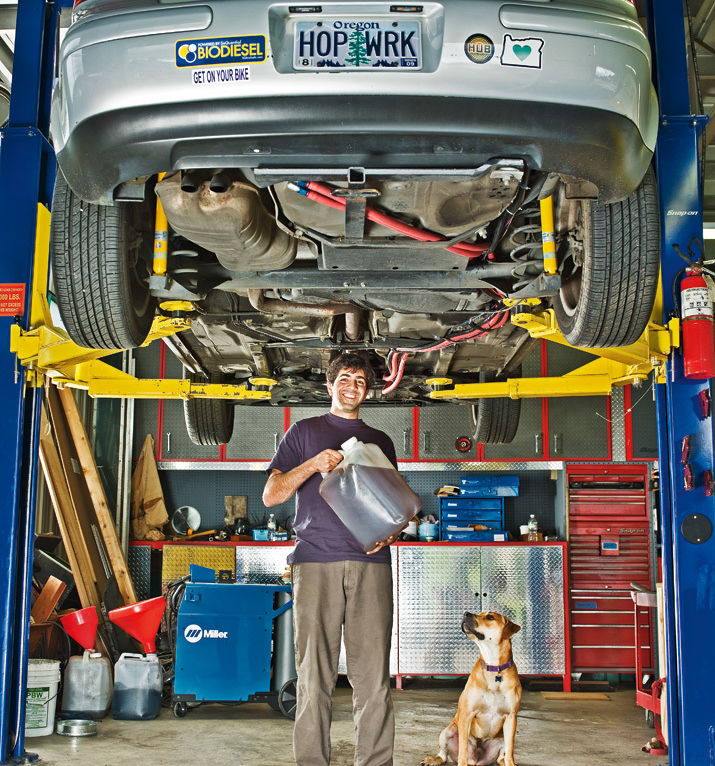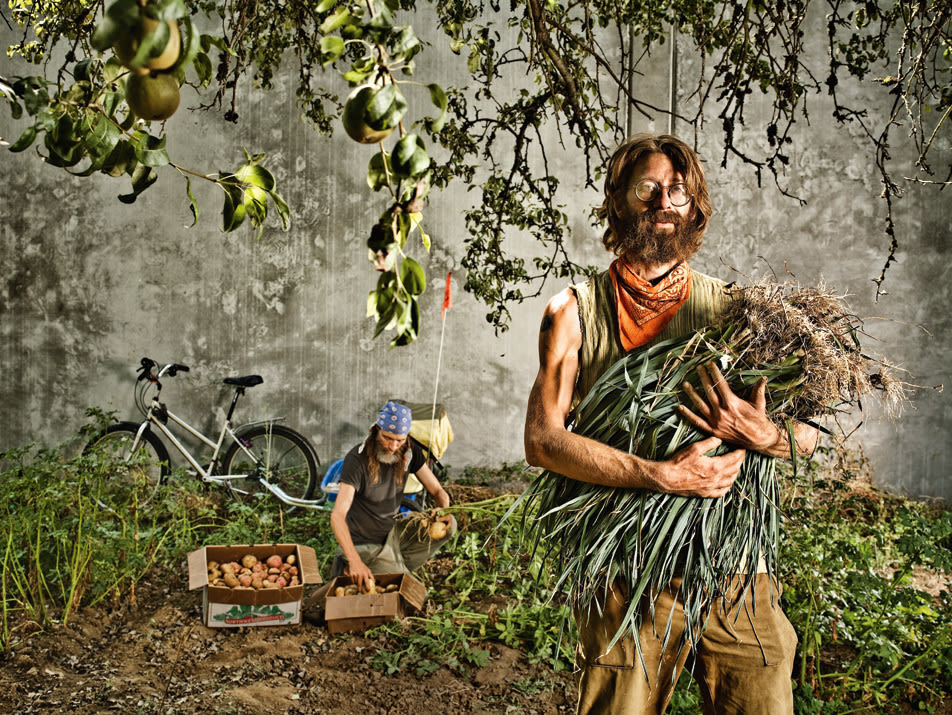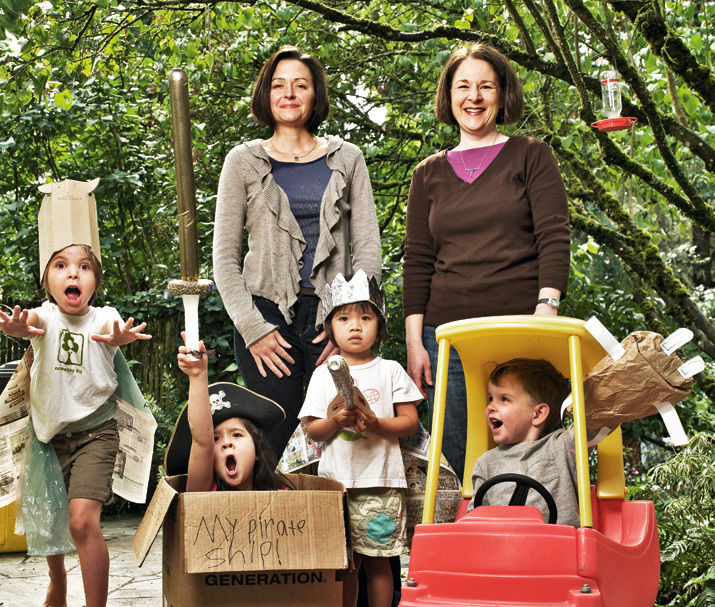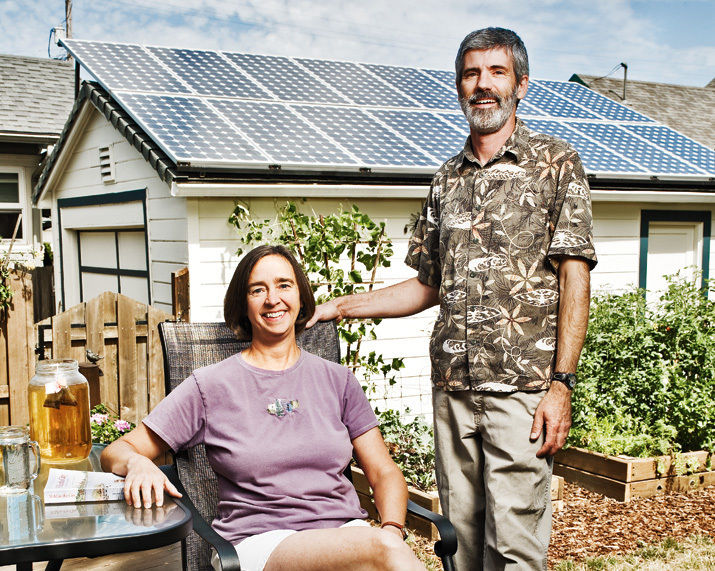Ecofreaks

Why toss your fry oil when you can put it in your gas tank? Farhad Ghafarzade and Muggs in the North Portland garage where Ghafarzade converts diesel engines to veggie oil engines.
The City Slicker
IF IT HADN’T BEEN for a $400 cream-colored 1980 Mercedes, Farhad Ghafarzade might have gone to dental school. Ghafarzade bought the car while studying molecular biology at University of California, Santa Cruz and, just for a lark, decided to convert the car’s engine to run on used cooking oil, which emits (depending on the oil used) around 70 percent less carbon dioxide than diesel fuel. “I was the crazy guy who went around collecting grease from the dining halls,” he says.
After driving the car for two years and 50,000 miles, Ghafarzade sold it for $2,800, promptly upgrading to a Ford Econoline van, which he also converted to run on veggie oil. When he sold that van for $5,600 ($2,600 more than what he paid for it), it hit him: “I can earn a living doing this.”
Indeed, grease has become Ghafarzade’s way of life. Last July, the 25-year-old rented a two-car garage on N Interstate Avenue, where he now charges people to convert their diesel-powered vehicles into vegetable-oil-fueled eco-machines. So far he’s completed about 60 conversions, and his mechanical handiwork is in high demand—especially among restaurant owners, who have a ready supply of grease at their disposal. Ghafarzade converted a pickup truck for Lucky Lab Brewing Company, and did the same for ¿Por Qué No? taqueria, whose owners sent Ghafarzade the 1991 Ford E350 ambulance it uses to shuttle equipment between its two locations. Most recently, he’s retooled the engine of a Volkswagen TDI driven by Hopworks Urban Brewery owner Christian Ettinger, who also asked Ghafarzade to convert the brewery’s beer-making equipment to run on grease (a project that’s a work in progress). Still, even with a steady flow of customers, Ghafarzade admits that dentistry would have been more lucrative. (Standard conversions run around $2,500.) “But it’s like, why not do something fun,” he says. “I’d rather have an interesting story to tell when I’m 65, and be that cool uncle, the one who did funky things.” And who, in the process, helped ease his environmental burden on the planet.
Farmer in the Hood

You want local? You got local: Kollibri Terre Sonnenblume (right) grows organic produce in the yards of Southeast Portland homeowners; one of his project partners (left) sorts through a box of vegetables.
KOLLIBRI TERRE SONNENBLUME (his name means “hummingbird,” “earth,” “sunflower” in Norwegian, French, and German, respectively) wasn’t trying to redefine the term “locally farmed” in spring 2007. He was trying to save his own hide. His organic-farming operation, Sunroot Gardens, was supposed to be located on a three-acre plot that he intended to rent in North Plains, about 20 miles west of Portland. But when a dispute arose with the owner of the parcel, he suddenly found himself sans land and in big trouble. Ten households had already paid him some $500 each for six months’ worth of fruits and vegetables—and they were expecting their first delivery of fresh organic produce in just a few weeks. “I’ve got to find someplace else to farm now,” Sonnenblume recalls thinking. So Sonnenblume, who owned no land, no tractor, not even a pickup truck (a silver cruiser bike was his sole mode of transport) did what he had to do: convince a bevy of Southeast Portland homeowners to let him garden in their front yards, backyards, side lots, even vacant plots. Some just wanted to help, others requested a share of his yield. “Each garden’s got its own story,” says Sonnenblume, who now has an inventory of some 30 plots, where he grows everything from multicolored peas and purple potatoes to heirloom white carrots and even Virginia tobacco (which he dries and hand-rolls for his personal pleasure). So how does big-city farming stack up to toiling in the country? “You’re less than a mile from where your salad is growing,” Sonnenblume says. Food doesn’t get any more local than that.
Moms on a Mission

Go ahead and play in the recycling bin, kids! Moms Heather Hawkins, (left) Renee LImon, and members of their broods.
HEATHER HAWKINS and Renee Limon hate corn-based plastic. “It’s a contaminant in the recycling process!” says Hawkins. “It’s not biodegradable!” Limon bristles. They should know. Last year, the pair of stay-at-home moms (and Southwest Portland neighbors) completed the Office of Sustainable Development’s nine-week Master Recycler Program—knowledge they’ve put to use on their blog, Enviromom.com. Launched in March 2007, the website receives some 25,000 visitors per month and hosts discussions on such varied topics like what to do with old toothbrushes (great for scrubbing fingernails and grout!), and heated debates on the most environmentally friendly way to dispose of dog poop. “It was a big controversy,” says Hawkins. (After a thorough investigation, Hawkins found that it’s best just to bag it and toss it in the garbage.) The duo even launched the One Can a Month Challenge this summer, in which they encouraged families to reduce their garbage to a single bin per month—though both admit this became much easier when the kids in their homes no longer needed diapers. “Diapers are like little bombs—you can’t compact them,” says Limon, whose most recent haul of garbage consisted of little more than dental floss and cotton balls. But Hawkins and Limon don’t just sit around chatting away in cyberspace. The pair also started GreenGroup, a sort of recycling support group for a few moms (and occasionally some dads) to get together to kick around ways to live more sustainably. Like the website, this too went viral, spawning chapters all over the city. Still, the pair isn’t out to browbeat people with their reduce-reuse-recycle mantra. “We don’t want to overwhelm anyone,” says Hawkins. “We’re big proponents of baby steps—just starting with one small change.”
The Power Couple

What do Kathy and Andrew Kerr pay for power in the summer months? Pretty close to zilch.
THE SUN SEEMS LIKE a fiery ball of bad news these days. Blamed for everything from premature aging to skin cancer, it’s a wonder we don’t all just pull down the shades and willingly turn into cave people. Hollywood neighborhood residents Andrew and Kathy Kerr, on the other hand, can’t catch enough rays. “We’re kind of solar evangelists,” Andrew says. The Kerrs are not, however, remotely interested in a killer tan. In September 2001, the couple became the first Pacific Power customers to install solar panels on the roof of their home. “We wanted to show that it could be done,” says Andrew. By the summer of 2002, the 2,000-kilowatt unit on their south-facing garage roof earned them their first negative electric bill. “It was minus $11!” Kathy laughs. They also got serious about reducing their electricity use by buying efficient appliances and remaining vigilant (even militant) about turning off lights, though Kathy insists that they are, in fact, a “normal family.” (The couple’s two teenage daughters, who then lived at home in the family’s four-bedroom bungalow, “used the microwave and had hair dryers going all the time.”) The Kerrs have so geeked out on solar power—they delight in creating month-to-month colored charts showing how much energy their home produces—that last year they installed a smaller 10-panel system on a west-facing roof. Now they enjoy an energy surplus for eight months out of the year. The pair also hosts “green tours” with the Portland Office of Sustainability, where the No. 1 question is, “How long does it take to make your money back?” After all, solar systems can cost up to $36,000. To which Kathy usually responds, patiently, “It’s a choice, not an investment. It’s more about, What’s your impact on the world going to be?”




